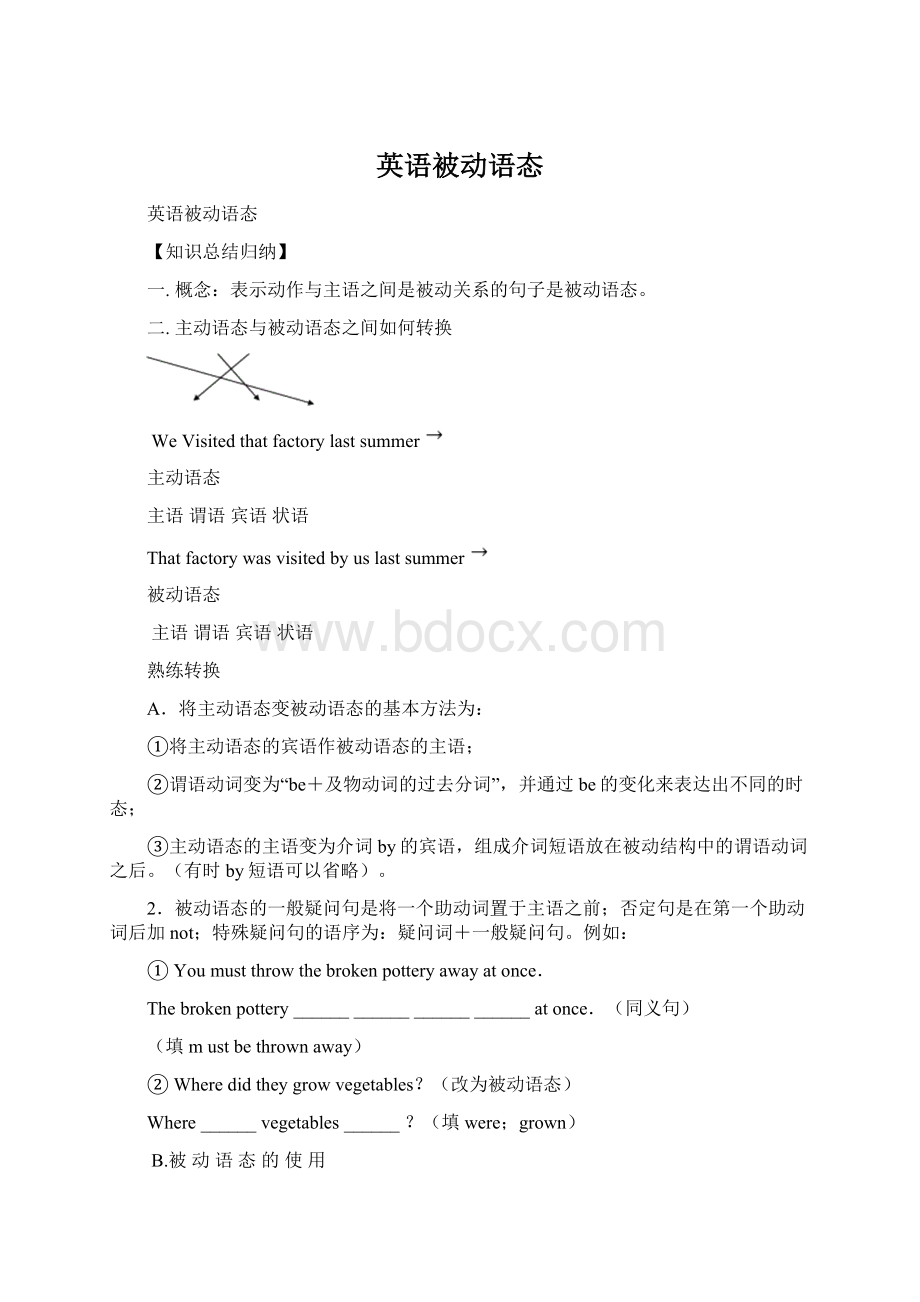英语被动语态.docx
《英语被动语态.docx》由会员分享,可在线阅读,更多相关《英语被动语态.docx(14页珍藏版)》请在冰豆网上搜索。

英语被动语态
英语被动语态
【知识总结归纳】
一.概念:
表示动作与主语之间是被动关系的句子是被动语态。
二.主动语态与被动语态之间如何转换
WeVisitedthatfactorylastsummer
主动语态
主语谓语宾语状语
Thatfactorywasvisitedbyuslastsummer
被动语态
主语谓语宾语状语
熟练转换
A.将主动语态变被动语态的基本方法为:
①将主动语态的宾语作被动语态的主语;
②谓语动词变为“be+及物动词的过去分词”,并通过be的变化来表达出不同的时态;
③主动语态的主语变为介词by的宾语,组成介词短语放在被动结构中的谓语动词之后。
(有时by短语可以省略)。
2.被动语态的一般疑问句是将一个助动词置于主语之前;否定句是在第一个助动词后加not;特殊疑问句的语序为:
疑问词+一般疑问句。
例如:
①Youmustthrowthebrokenpotteryawayatonce.
Thebrokenpottery________________________atonce.(同义句)
(填mustbethrownaway)
②Wheredidtheygrowvegetables?
(改为被动语态)
Where______vegetables______?
(填were;grown)
B.被动语态的使用
1.当不知道或没有必要指出动作的执行者时,常用被动语态,这时往往不用by短语。
“Mr.White,thecupwasbrokenafterclass.”
2.突出或强调动作的承受者,如果需要说出动作的执行者,用by短语。
TheserecordsweremadebyJohnDenver.
ThecupwasbrokenbyPaul.
3.当汉语句子的主语既不是动作的执行者,也不是动作的承受者时,这时常用in+名词作状语,而代替by短语。
ThesecarsweremadeinChina.
三.各种不同时态的主动语态与被动语态的对比
时态
主动语态
被动语态
一般现在时
am/is/are+P.P.
(1)DotheyspeakFrench?
(2)Theydon’tusetheroom.
IsFrenchspokenbythem?
Theroomisn’tusedbythem.
一般过去时
was/were+p.p.
(1)Thehunterkilledatiger.
(2)Hewrotemanystorieslastyear.
Atigerwaskilledbythehunter.
Manystorieswaswrittenbyhimlastyear.
现在进行时
am/is/are+being+p.p.
(1)Theseworkersarebuildinganewbridge.
(2)Heismendinghiscar.
Anewbridgeisbeingbuiltbytheseworkers.
Hiscarisbeingmendedbyhim.
过去进行时
was/were+being+p.p.
(1)Hewassellingbooks.
(2)Theywerediscussingtheplanatthattime.
Bookswerebeingbuiltbyhim.
Theplanwasbeingdiscussedbythematthattime.
现在完成时
have/has+been+p.p.
(1)ShehaslearnedmanyEnglishwords.
(2)Hehasfinishedthework.
ManyEnglishwordshavebeenlearnedbyher.
Theworkhasbeenfinishedbyhim.
过去完成时
had+been+p.p.
(1)Theyhassolvedtheproblem.
(2)Wehadtoldhimthenewsbythen.
Theproblemhadbeensolvedbythem.
Thenewshadbeentoldtohimbyus.
一般将来时
shall/willbe+p.p.
(1)Ishallmakeaplan.
(2)Theyaregoingtofixtheradioinanhour.
Aplanwillbemadebyme.
Theradioisgoingtobefixedbytheminanhour.
过去将来时
wouldbe+p.p.
was/weregoingtobe+p.p.
(1)Hetoldmetheywouldpainttheroom.
(2)Theyweregoingtoputonaplaythenextweek.
Hetoldmetheroomwouldbepaintedbythem.
Aplaywasgoingtobeputbythemthenextweek.
情态动词
can/may/must/should
+be+p.p.
(1)Weshouldhandinourhomework.
(2)YoumustanswerthequestioninEnglish.
Ourhomeworkshouldbehandedinbyus.
Thequestionmustbe
answeredinEnglishbyyou.
四.如何正确使用被动语态
1.含双宾语的主动结构变为被动结构时,有两种方法:
①将间接宾语变为主语,直接宾语保持不变;
②将直接宾语变为主语,间接宾语用介词to或for引导。
例如:
①Heoftentellsusinterestingstories.(主动语态)
(被动语态)
②Hermothergaveheranewpen.(变被动语态)
Anewpen__________________herbyhermother.
(填wasgivento)
▲1.一般在下列动词后,常在间接宾语前用介词to,如:
bring,give,hand,lend,offer,pass,pay,promise,sell,show,take,teach,tell等。
(1)Thebookwasshowedtotheclass.
(2)Mybikewaslenttoher.
2.一般在下列动词后,间接宾语前用介词for,如:
build,buy,cook,cut,choose,do,fetch,find,fix,get,keep,make,order,paint,play,sing等。
(1)Anewskirtwasmadeforme
(2)Themeatwascookedforus.
2.在主动语态中,某些动词之后带有复合宾语,即宾语和宾语补足语,这个复合宾语由动词不定式来充当,to被省略,但在被动语态中,这个to还要还原。
eg.Ioftenhearhersingthispopularsong.(主动语态)
Sheisoftenheardtosingthispopularsong.(被动语态)
此类用法常用动词有:
make,let,see,hear,watch,feel,noticelistento,lookat,等。
3.有些“be+过去分词”的结构并不是被动语态,它们有可能是“系表结构(即系动词之后由过去分词来充当表语)。
”
比较:
(1)
(2)
4.只有及物动词和可有宾语的动词+介词词组才可以有被动语态。
eg.
五.注意特例
将主动语态变被动语态应注意几个特殊情况:
1.短语动词的被动语态:
在变为被动语态时,要将短语动词视为一个整体,其后的介词或副词不能省去。
如:
agreeto,askfor,laughat,operatedon,listento,lookafter,thinkof,talkabout,bringabout,carryout,findout,giveup,handin,makeout,passon,pointout,putaway,putoff,thinkover,turndown,workout,turnout等。
例如:
①Thisdictionarymustn't______fromthelibrary.
A.takeaway
B.takenaway
C.aretakenaway
D.betakenaway[D]
②Shewilltakegoodcareofthechildren.(变被动语态)
Thechildrenwill______________________________(byher).
(填betakengoodcareof)
2.含有复合宾语的主动结构变被动结构时,通常将宾语变为被动句的主语,而宾语补足语就成为主语补足语。
注意:
省略to的不定式作宾补时,不定式符号to必须补上。
例如:
SomeonesawhimswiminQianlingLakeyesterday.(变被动
He__________________swiminQianlingLakeyesterday.
(填wasseento)
3.不定式的被动结构:
动词不定式的被动语态为“tobe+过去分词”。
例如:
Theradiosaysawildanimalzooisto______inourcity.
A.bebuilding
B.build
C.bebuilt
D.built[C]
4.以who为主语开头的疑问句,变被动时,用bywhom放在句首:
Whowrotethestory?
误:
Whowasthestorywritten?
正:
Bywhomwasthestorywritten?
5.当主动句的主语是nobody,noone等含有否定意义的不定代词时,被动句中将其变为anybody,作by的宾语,并将谓语动词变为否定的被动语态。
如:
Nobodycananswerthisquestion.
误